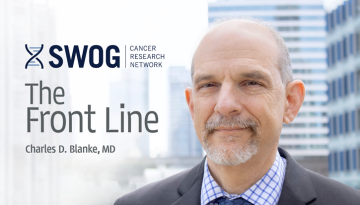Member Highlight: USC Norris Comprehensive Cancer Center
In previous SWOG member site profiles I've done in this space, I've highlighted community oncology sites and full NCORPs, along with a Veterans Affairs medical center storefront.
Another one of our key membership categories is the main member LAPS, or Lead Academic Participating Site. A great example from this group of SWOG sites is the University of Southern California School of Medicine and Norris Comprehensive Cancer Center.
The SWOG principal investigator for this LAPS is Dr. Heinz-Josef Lenz (also deputy director for research programs at Norris), and our lead oncology research professional (the leadership position previously known as head CRA) is Victoria Soto.
As a LAPS within the National Cancer Institute’s National Clinical Trials Network, USC Norris also represents six component sites throughout the Los Angeles area. Together, these are home institutions for a team of more than 200 individual SWOG members, both investigators and associates.
USC Norris was one of the original eight institutions designated a comprehensive cancer center by the NCI, way back in 1973, and – with a vision of reducing the burden of cancer for all people – it serves one of the most diverse patient populations in the nation. Its catchment area is essentially Los Angeles County, home to about 10 million residents widely diverse across many dimensions – ethnicity, race, immigration status, socioeconomic status, and more.
The USC Norris Office of Community Outreach and Engagement is a key component in serving that community, monitoring the cancer-related needs of residents, fostering community outreach and education, and working to enhance enrollment of community members to the clinical trials USC offers.
The hub of clinical research infrastructure at the cancer center is their Clinical Investigations Support Office (CISO), which works with investigators on both clinical and translational research and oversees all NCI-supported trials. That office is led by Dr. Anthony B. El-Khoueiry, a familiar name at SWOG (and a graduate of our Early-Stage Investigator Training Course). Research at Norris is organized under five interdisciplinary programs in basic, translational, and population sciences, and the cancer center supports seven shared-resource research cores for its investigators, in areas that include data science and liquid biopsy research, the latter core directed by Dr. Amir Goldkorn, whose liquid biopsy work we’ve highlighted in several venuesin recent years (Dr. Goldkorn is yet another ESITC graduate, incidentally).
From SWOG’s perspective, the USC Norris Comprehensive Cancer Center regularly appears on our list of top enrollers to our trials, including the list we announced at our last group meeting.
Among recent SWOG trials they’ve contributed to most notably, our S1011 surgical study in muscle-invasive bladder cancer (read about the recently reported results) stands out, as USC Norris enrolled about one-fourth of all patients accrued to this phase 3 trial. Actually, I want to give a particular shout-out here to USC Norris’s Dr. Siamak Daneshmand, who was the enrolling physician for one of every five S1011 participants(total trial enrollment exceeded 600 – do the math!). Dr. Daneshmand is also our GU committee’s organ site chair for localized bladder cancer.
I’ll close this profile with reference to how Norris represents the patient perspective in their clinical care and research decision-making. Like SWOG’s patient advocate committee, Norris’s community advisory board brings community patient advocates to the table, advising leadership on the needs of their individual communities and facilitating communication between the cancer center and those communities.
Norris’s Cancer Survivorship Advisory Council represents the face of survivors, working to help patients – and caregivers – at all stages of the cancer journey. In addition to advising researchers on patient care quality issues, they develop their own support programs, such as their Financial Toxicity Project, which works to lower barriers that can keep patients from accessing financial resources intended to help with cancer-related costs.
With registration for SWOG’s spring group meeting in Seattle now open, we’ll learn soon enough whether USC Norris again makes our short list of top accruers. But whether they’re in the top five this time or not, they’ve clearly been – and, I’m confident, will continue to be – a significant factor in SWOG’s success in significantly improving lives through cancer clinical trials and translational research. We’re grateful.
Other Recent Stories



